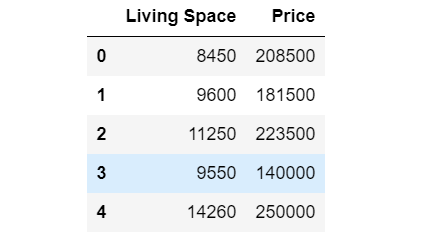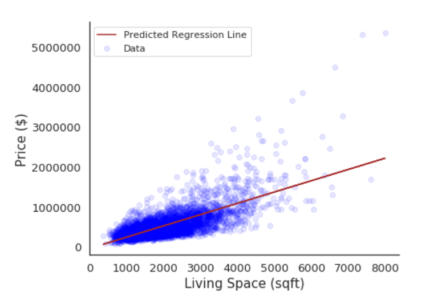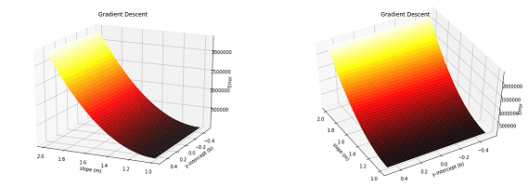Artificial Intelligence Certification Course
- 19k Enrolled Learners
- Weekend
- Live Class
Machine Learning is undoubtedly the most in-demand technology of the era! If you’re a beginner who’s getting started with Machine Learning, it’s important you know the prerequisites for Machine Learning. This blog will help you understand the different concepts you need to know before starting with Machine Learning.
To get in-depth knowledge of Machine Learning, you can enroll in the live Machine Learning Engineer Course by Edureka with 24/7 support and lifetime access.
Here’s a list of topics covered in this blog:
To get started with Machine Learning you must be familiar with the following concepts:
Statistics contain tools that can be used to get some outcome from the data. There is descriptive statistics which is used to transform raw data in some important information. Also, inferential statistics can be used to get important information from a sample of data instead of using complete dataset.
To learn more about Statistics you can go through the following blogs:
Linear algebra deals with vectors, matrices, and linear transformations. It is very important in machine learning as it can be used to transform and perform operations on the dataset.
Calculus is an important field in mathematics and it plays an integral role in many machine learning algorithms. Data set having multiple features are used to build machine learning models as features are multiple multivariable calculus plays an important role to build a machine learning model. Integrations and Differentiations are a must.
Probability helps predict the likelihood of the occurrences, It helps us to reason the situation may or may not happen again. For machine learning, probability is a foundation.
To learn more about Probability, you can go through this All You Need To Know About Statistics And Probability blog.
It is essential to know programming languages like R and Python in order to implement the whole Machine Learning process. Python and R both provide in-built libraries that make it very easy to implement Machine Learning algorithms.

Apart from having basic programming knowledge, it is also important that you know how to extract, process and analyze data. This is one of the most important skills that is needed for Machine Learning.
To learn more about the programming languages for Machine Learning, you can go through the following blogs:
Machine learning is all about creating an algorithm that can learn from data to make a prediction like what kinds of objects are there in the picture, or recommendation engine, the best combination of drugs to cure the certain disease or spam filtering.
Machine learning is built on mathematical prerequisites and if you know why maths is used in machine learning it will make it fun. You need to know the maths behind the functions you will be using and which model is suitable for the data and why.
So let’s start with an interesting problem of predicting house prices, having a dataset containing a history of different features and prices, for now, we will consider the area of the living space in square feet and the prices.
Now we have a data set containing two columns as shown below:

There must be some correlation between these two variables to find out we will need to build a model which can predict the price of houses, how can we do it?
Let’s graph this data and see how it looks like:
 Here X-axis is the price per sqft of living space and the Y-axis is the price of the house. If we plot all the data points we will get a scatter plot which can be represented by a line as shown in the figure above and if we input some data it will then predict some outcome. Ideally, we have to find a line that will intersect the maximum data points.
Here X-axis is the price per sqft of living space and the Y-axis is the price of the house. If we plot all the data points we will get a scatter plot which can be represented by a line as shown in the figure above and if we input some data it will then predict some outcome. Ideally, we have to find a line that will intersect the maximum data points.
Here we are trying to create a line which is termed as:
Y=mX + c
This method of predicting the linear relationship between the target (dependent variable) and predictor variable (independent variable) is termed as linear regression. It allows us to study and summarize a relation between two variables.
If we consider the equation we have values for X which is an independent variable, so all we have to do is calculate values for m and c in order to predict the value of Y.
So how do we find these variables?
In order to find these variables, we can try a bunch of values and try to find out a line which intersects the maximum number of data points. But, how can we find the best fit line?
So in order to find the best-fit line, we can use least squares error function that will find the error between the real value of y and the predicted value y`.
The least-squares error function can be represented using the following equation:

Using this function we can find out the error for each predicted data point by comparing it with the actual value of the data point. You then take the summation of all these errors and square them to find out the deviation in the prediction.
If we add the third axis to our graph containing all possible error values and plot it in 3-Dimensional space, it will look like this:

In the above image, the ideal values would be in the bottom black part which will predict the prices close to the actual data point. The next step is to find the best possible values for m and c. This can be done by using the optimization technique called gradient descent.
Gradient descent is an iterative method, where we start with initializing some set of values for our variables and improve them slowly by minimizing the error between the actual value and the predicted value.
Now if we think practically the prices of the apartment don’t really depend only on price per square feet, there are many factors such as the number of bedrooms, bathrooms, etc. If we consider those features as well then the equation will look something like this
Y = b0 + b1x1 + b2x2 + …..+bnxn + c
This is multilinear regression this belongs to linear algebra, here we can use matrices of size mxn where m are features and n are data points.
Let’s consider another situation where we can use probability to find the condition of the house in order to classify a house based on whether it is in good condition or bad condition. For this, to work we will have to use a technique called Logistic Regression which works on the probability of occurrences represented by a sigmoid function.
In this article, we covered the prerequisites of machine learning and how they are applied in machine learning. So basically, it consists of statistics, calculus, linear algebra, and probability theory. Calculus has techniques used for optimization, linear algebra has algorithms which can work on huge data sets, with probability we can predict the likelihood of occurrences and statistics helps us infer useful insights from the sample of data sets.
Now that you know the Prerequisities for Machine Learning, I’m sure you’re curious to learn more. Here are a few blogs that will help you get started with Data Science:
ML makes computers learn the data and making own decisions and using in multiple industries. It resolves the complex problem very easily and makes well-planned management. Our MLOps certification course provides certain skills to streamline this process, ensuring scalable and robust machine learning operations.
If you wish to enroll for a complete course on Machine Learning, Edureka has a specially curated Machine Learning Certification that will make you proficient in techniques like Supervised Learning, Unsupervised Learning, and Natural Language Processing. Check out this NLP Training by Edureka to upgrade your AI skills to the next levelIt includes training on the latest advancements and technical approaches in Artificial Intelligence & Machine Learning such as Deep Learning, Graphical Models and Reinforcement Learning.
 Thank you for registering Join Edureka Meetup community for 100+ Free Webinars each month JOIN MEETUP GROUP
Thank you for registering Join Edureka Meetup community for 100+ Free Webinars each month JOIN MEETUP GROUPedureka.co